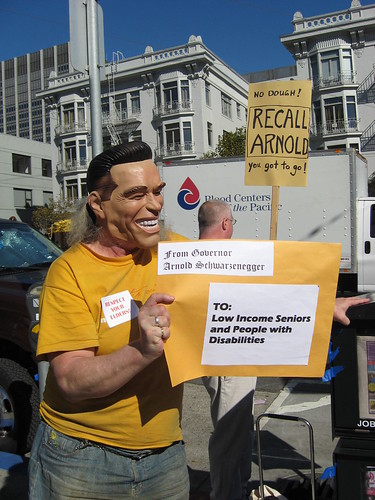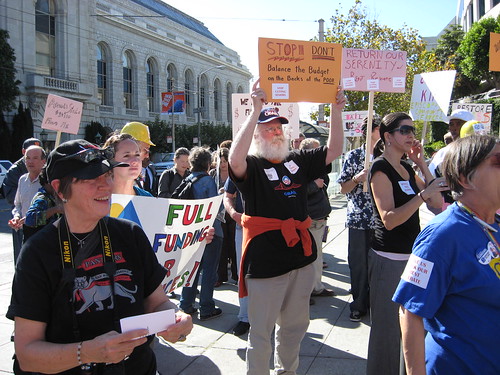Tenants remain the hidden victims of the mortgage crisis. More and more tenants are facing harassment and eviction at the hands of foreclosing banks. Meanwhile, the government is directing hundreds of billions of dollars to bail out wall-street investment houses, banks, and, to a much lesser extent, struggling homeowners.
While tenants do not get any affirmative relief in the bailout bill, tenants can at least breathe a sigh of relief that the bill, which rushed through congress last week, does not pre-empt local rent control laws for affected properties. Many rent-controlled tenants do not realize how easily their rent control protections could have been eliminated in recent weeks. This was a very serious concern given that the last big government bailout plan in the 1980’s was interpreted to preempt local rent control and eviction protections.
Scary Precedent from Savings & Loan Era In 1989, the government created the “Resolution Trust Corporation” to act as receiver for distressed financial institutions in response to the Savings and Loan crisis. The law creating the RTC directed the RTC to maximize the value of the assets it acquired and granted the RTC the power to disaffirm or repudiate contracts which it found to be burdensome.
Predictably, the RTC came into possession of occupied rental property where tenants were protected by local rent control laws. The RTC sought to repudiate the tenants’ leases. The matter went to court and a federal appellate court sided with the RTC, incorrectly holding that the RTC was empowered to terminate the tenancies notwithstanding the protections of state and local law.
See Resolution Trust Corporation v. Diamond, 18 F.3d 111 (2d Cir. 1994). As with the legislation setting up the RTC, it has been clear in recent weeks that any bailout legislation would involve a government entity buying up mortgages of occupied properties, including tenant-occupied properties, and reselling them to the private sector. There was a danger that the government, or predatory investors who purchased from the government, would seek to increase the value of the properties by evading local tenant protections like rent control.
In a
recent article, New York tenant lawyer Bob Katz is quoted as follows: "If [Congress] follows the resolution trust model, I believe the [trust] will be able to evict tenants.”
Thus, the language in the bailout legislation on this issue became critical for tenants.
Tenant Protection Language Included in Bailout Legislation Due to persistence and vigilance of tenant organizations and other allies in New York, Washington D.C. and California, the final bailout bill makes sure that tenant rights are not obliterated by the passage of the bill. The bailout legislation expressly states that it does not pre-empt state and local tenant protections (including rent control) for buildings where the Treasury acquires the mortgage.
Section 109(b) provides: “In the case of a mortgage on a residential rental property, the plan required under this section shall include protecting Federal, State, and local rental subsidies and protections…” Section 110(b)(3) contains similar language with respect to mortgage modifications to minimize foreclosures on residential rental properties.
The importance of these provisions cannot be understated. The bailout legislation could easily have been written like the RTC legislation. Without these explicit limitations on the power of the Treasury, courts could have followed the
Diamond case and ruled that the bailout legislation authorizes the Treasury to manage and dispose of assets without regard to local tenant protections.
Tenant advocates recognize that there is little to celebrate in the bailout bill. The bill provides no direct relief for tenants affected by foreclosure. The bill may help property owners avoid some foreclosures, thus indirectly benefitting tenants who live at these properties. Other than that, tenants will not find their housing any more secure as a result of this bill.
But the situation could have been a lot worse. The bailout bill could have been a license to evict rent control tenants. The fact that the final bill leaves local tenant protections in place is a significant victory in a legislative process that focused on investors, banks and homeowners.


